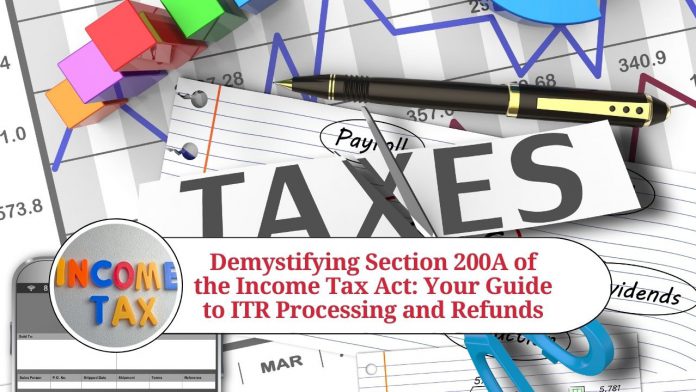Understanding Section 200A of Income Tax Act – A Comprehensive Guide
The Indian Income Tax Act is a complex piece of legislation that can be challenging for taxpayers to navigate. Among the various sections of the Act, Section 200A is an important provision that deals with the processing of tax returns and refunds. In this blog, we will discuss what Section 200A entails, its significance, and the key provisions that taxpayers need to be aware of.
What is Section 200A of Income Tax Act?
Section 200A of the Income Tax Act, 1961 was introduced by the Finance Act, 2009. The section deals with the processing of income tax returns (ITRs) filed by taxpayers and the issue of refunds. It outlines the process that the Income Tax Department must follow in processing returns and issuing refunds.
Significance of Section 200A
The introduction of Section 200A has streamlined the process of ITR processing and refund issuance, making it faster and more efficient. The section has also brought greater transparency to the process and helps taxpayers track the status of their refund applications.
Key Provisions of Section 200A
- Processing of ITRs: The Income Tax Department is required to process every ITR that is filed by a taxpayer. The processing involves verifying the information provided in the ITR against the information available with the department. If any discrepancies or errors are found, the department may issue a notice to the taxpayer seeking clarification or correction.
- Issue of Refunds: Section 200A mandates that the Income Tax Department must issue refunds to taxpayers within a specific timeframe. The department must issue refunds within 90 days of the filing of the return. If the refund is not issued within this timeframe, the department must pay interest on the amount of refund due to the taxpayer.
- Adjustment of Refunds: The department has the power to adjust any outstanding tax liability of the taxpayer against the refund due. This adjustment can be made if the department has evidence of unpaid tax liability.
- Communication with Taxpayers: Under Section 200A, the Income Tax Department must communicate with taxpayers regarding the processing of their ITR and the issue of refunds. The department must inform the taxpayer of any discrepancies or errors found in the ITR and any adjustments made to the refund amount.
Conclusion
Section 200A of the Income Tax Act, 1961 is an important provision that taxpayers must be aware of. It outlines the process for the processing of ITRs and the issue of refunds, bringing greater transparency and efficiency to the process. By following the provisions of this section, taxpayers can ensure that their ITR is processed correctly, and any refunds due are issued in a timely manner.
Read more useful content:
- section 145 of income tax act
- section 10e of income tax act
- section 9 of the income tax act
- section 94b of income tax act
- section 206aa of income tax act
Frequently Asked Questions (FAQs)
Q.1 What is Section 200A of the Income Tax Act? A. Section 200A of the Income Tax Act, 1961 is a provision that outlines the process for the processing of income tax returns (ITRs) and the issue of refunds.
Q.2 What is the significance of Section 200A? A. The introduction of Section 200A has streamlined the process of ITR processing and refund issuance, making it faster and more efficient. The section has also brought greater transparency to the process and helps taxpayers track the status of their refund applications.
Q. What is the processing of ITRs? A. The processing of ITRs involves verifying the information provided in the ITR against the information available with the department. If any discrepancies or errors are found, the department may issue a notice to the taxpayer seeking clarification or correction.
Q. How long does the Income Tax Department have to issue refunds under Section 200A? A. The Income Tax Department must issue refunds within 90 days of the filing of the return.
Q. What happens if the refund is not issued within the 90-day timeframe? A. If the refund is not issued within the 90-day timeframe, the department must pay interest on the amount of refund due to the taxpayer.
Q. Can the department adjust the refund amount against any outstanding tax liability of the taxpayer?
A. Yes, the department has the power to adjust any outstanding tax liability of the taxpayer against the refund due, if there is evidence of unpaid tax liability.
Q. Does the department communicate with taxpayers regarding the processing of their ITR and the issue of refunds?
A. Yes, under Section 200A, the Income Tax Department must communicate with taxpayers regarding the processing of their ITR and the issue of refunds. The department must inform the taxpayer of any discrepancies or errors found in the ITR and any adjustments made to the refund amount.




















